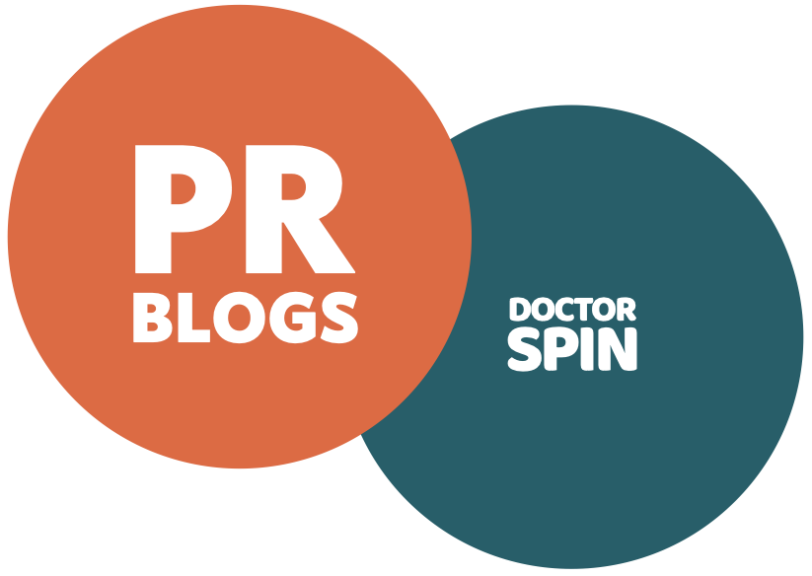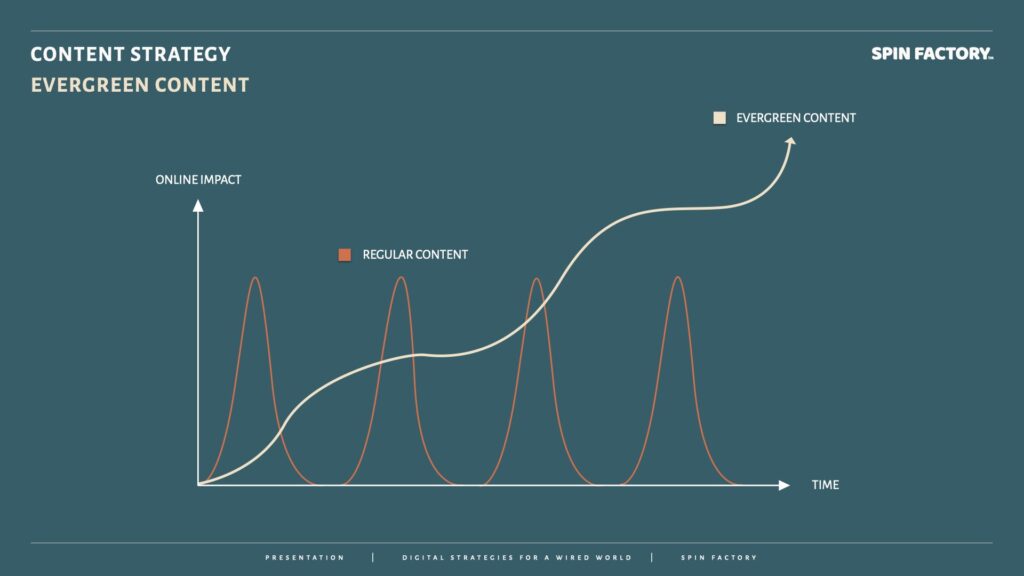Blogging is so passé, don’t you think?
In many ways, I’d agree: blogging is a faux pas.
There are no easy marketing wins with blogging anymore; regulations are making us all close cookie warnings left and right — and social media has sucked most comment sections dry.
Also, running a decent platform will cost you today.
Proper hosting will cost you.
A workable theme will cost you.
Secure encryption will cost you.
Image compression will cost you.
A form manager will cost you.
And so on.
Then, we have all those greasy, formulaic SEO-type blog posts. They’re produced en masse to capture attention and clicks, not hearts and minds. Oh god, how much I hate them.
And, finally, blogging just isn’t considered cool anymore.
So, why am I still blogging?
Here we go:
Evergreen Content
What’s evergreen content?
Evergreen content is an inbound approach to building core messages, content themes, content packages, deep content, and content skyscrapers.
For a piece of content to be evergreen, it must sustain its value over time. This means the content must be relevant today, tomorrow, and the foreseeable future.
While news content might make a more significant short-term splash, evergreen content accumulates online impact over time—which requires patience.
Now, forever is a long time. I typically apply these arbitrary rules to determine what constitutes evergreen content:
Learn more: The Evergreen Content PR Strategy
I Don’t Blog For “Marketing” or “Branding”
Most bloggers in the marketing- and media space would probably list the benefits of content marketing as reasons for blogging. And they wouldn’t be wrong — content marketing provides many brands with essential tools to reach and engage with their customers.
And from there, one might start praising email marketing, list building, SEO, conversion tactics, viral loops, and lead nurturing — all the remarkable wonders of inbound marketing.
I’m advocating all the abovementioned tactics and don’t mind using them myself. They’re great.
But I don’t blog to market myself.
Blogging, at least for me, has always meant something beyond personal branding, content marketing, and online revenue streams.
Learn more: The Online Base Camp
My Bottom Line is Not My “Why”
In PR, we often discuss the consumer’s intent. But we rarely discuss the producer’s intent.
We tend to think that an organisation’s “why” is straightforward. It seems simple enough: a business must grow, a political organisation needs power, a non-profit advocates change, and an influencer seeks revenue.
I’m no different: I rely on clients to make a living.
Many get it wrong by seeing these bottom lines as “strategic starting points” for their PR messages. But that’s wrong — your bottom line should never be your communication platform.
Why? Your bottom line is only significant for you.
Bottom Line Communication is Boring
We’re all subject to various biases. A brand’s bottom line isn’t a communicative strength; it’s a bias.
“Bias is a disproportionate weight in favor of or against an idea or thing, usually in a way that is closed-minded, prejudicial, or unfair. Biases can be innate or learned. People may develop biases for or against an individual, a group, or a belief. In science and engineering, a bias is a systematic error. Statistical bias results from an unfair sampling of a population, or from an estimation process that does not give accurate results on average.”
Source: Wikipedia
Building a communication platform based on your bottom line and bias corrupts everything downstream. If nothing else, biases should be monitored and counteracted, not put on a pedestal and flaunted.
Think about it:
These dichotomies are contrarian, for sure.
Communication hits differently.
Wise business leaders don’t sound like typical business leaders. Savvy entrepreneurs don’t sound like typical entrepreneurs. Competent corporate spokespeople don’t sound like typical corporate spokespeople.
And smart bloggers don’t sound like typical bloggers.
If all you ever care about is your bottom line, that’s okay. It’s fine if you want to talk about what you want for yourself.
But don’t expect people to listen. Don’t expect people to care.
Readers Are Not Wallets-on-Legs
When discussing PR with clients, I seek their humanity, not quarterly business objectives. I’m not there to help them bore people to death.
If I were blogging with the primary intent of somehow taking your money away, you would feel it instinctively. You would feel it between the lines of every blog post. And you probably wouldn’t like it.
Put in another way: We all hate being talked to as wallets-on-legs.
In the eyes of funnel fundamentalists, we are demographic entities stripped of our essence, mere puppets of consumption with wallets in place of hearts.
Your intent matters as much as what you say. We cannot escape our biases, but we can be transparent and make conscious efforts to ‘speak human’ — to speak of matters of the heart.
Read also: William Faulkner on Writing From the Heart
The Narcissistic Principle
“People want to be loved; failing that admired; failing that feared; failing that hated and despised. They want to evoke some sort of sentiment. The soul shudders before oblivion and seeks connection at any price.”
— Hjalmar Söderberg (1869−1941), Swedish author
When we share on social media, we share for a reason. And that reason typically has something to do with… ourselves:
It’s the narcissistic principle behind why we share on social media.
The narcissistic principle = when we share or engage on social media, we mainly share aspects of ourselves — because that’s what we care about most. 1Silfwer, J. (2012, July 16). The Narcissistic Principle. Doctor Spin | The PR Blog. https://doctorspin.net/narcissistic-principle/
If you can get social media to work for you, great.
Make the most of it.
However, we should all be mindful not to let the “online pressure cooker” get the better of us.
“A status update with no likes (or a clever tweet without retweets) becomes the equivalent of a joke met with silence. It must be rethought and rewritten. And so we don’t show our true selves online, but a mask designed to conform to the opinions of those around us.”
— Neil Strauss, Wall Street Journal
Learn more: The Narcissistic Principle
I Blog Because Blogging Makes Me Happy
My background is simple. I’ve never gotten anything for free in life. Growing up, everyone around me hated their jobs — and I don’t blame them. There are many soul-sucking jobs out there. I’m immensely thankful that I’ve found a profession I love.
I still blog because PR is such an exciting and fascinating profession. If I enjoy writing about PR, the chances are that someone will enjoy reading it. And I think my take on public relations deserves an online basecamp.
Now, I want to make as much money as anyone else. But I try not to let my bottom line interfere with my purpose. Why would I? Communicating out of genuine passion isn’t bad for business, you know?
Most importantly, I’m always happy when I write about PR.
That’s why I’ve been blogging before, during, and after, and it was cool.

THANKS FOR READING.
Need PR help? Hire me here.

PR Resource: PR Blogs
List of PR Blogs

PR blogs come and go, and some seem to go on and on — I should know. I’ve been blogging before, during, and after it was considered cool. Today, I still find that having a great website is underrated.
Many organisations overestimate their social media presence and underestimate their online base camp — their website.
Blogging is still the cornerstone of content communications. To stay current, I update this list with active blogs on public relations and communications (2024).
Would you happen to know of an active PR blog that I should include in this list? Please let me know!
Learn more: Doctor Spin’s List of PR Blogs
Annotations
| 1 | Silfwer, J. (2012, July 16). The Narcissistic Principle. Doctor Spin | The PR Blog. https://doctorspin.net/narcissistic-principle/ |
|---|



